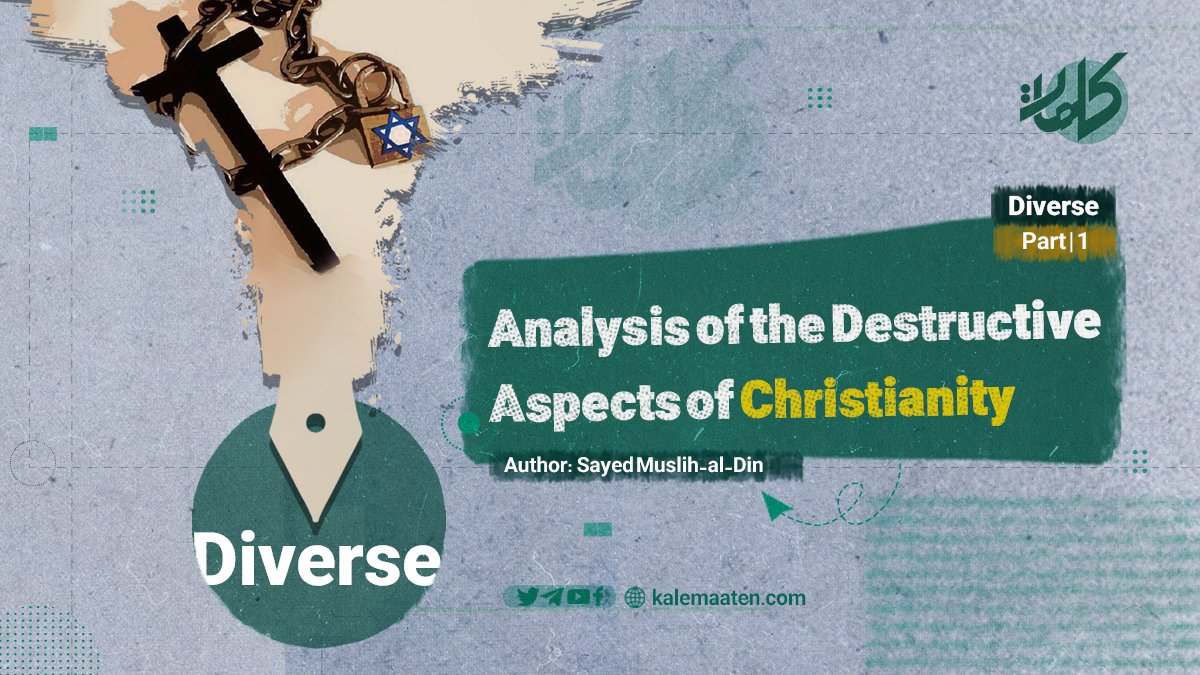
Author: Sayed Muslih-al-Din
Analysis of the Destructive Aspects of Christianity (Part One)
Introduction:
Throughout history, humanity has encountered a range of thoughts and ideas presented by various individuals and groups, each influencing society in its own way. From the time of Greek philosophers and the “First Teacher” to today, when we witness an unparalleled diversity of ideologies, schools of thought, and numerous names, all have left their mark on human societies.
In accepting any ideology, humanity has paid attention to the validity and strength of its evidence, its legitimacy and source, as well as the method of expression and the efforts made to promote it. The most important criteria for the popularity and acceptance of an ideology are the manner of its presentation and promotion, along with the amount of effort and hardship endured to spread it. These two factors can significantly influence the audience’s reception and the ideology’s place in society.
Of course, the temporary rise of an unfounded belief and the short-term dominance of its proponents cannot be considered a measure of its legitimacy and sustainability. Presenting any idea involves great efforts and heavy costs to ensure it spreads among the people. The time period between the emergence and decline of these beliefs is usually long-, and this-time gap may deceive the masses and cause doubt about the falsehood of some ideologies. However, the truth is that ultimately, falsehood will perish, and truth will prevail over everything. This is a reality that requires patience and perseverance to witness. Our strong conviction in the downfall of false beliefs rests on this divine promise: “And say, ‘The truth has come, and falsehood has vanished. Indeed, falsehood is bound to vanish.'”
Throughout history, it has been observed that any false concept, even if it appears in the form of an ideology or a specific framework and casts a shadow over people’s minds, thoughts, culture, and lives, does not last and soon disappears from the stage of time. After not too long, not only does this falsehood fade away, but its effects are also erased from the respective society.
Moreover, when comparing factors that influence the spiritual and divine aspects of human life, their endurance and effectiveness throughout history hold great significance. This means that when evaluating major phenomena like religions, cultures, social systems, and even smaller ones like a book or a speech, the longevity and outcomes they produce (such as the lasting teachings of a religion or the impact of a book on various societies) can indicate their true position, importance, influence, and even their truth or falsehood. Although this type of examination may seem more like quantitative and statistical evaluations on the surface, it is clear that any concept that has greater acceptance and durability among human societies must be of high quality.
Any program for human development that history has witnessed, whether it stems from religion, books, or speeches, has always had a target audience: the general public. People have never been forced to accept a religion, choose a social system, read a book, or listen to a speech. However, at certain points in history, there have been instances where this path was imposed by force; even today, in some areas, specific groups, often Muslims, are compelled to accept certain beliefs and are restricted in expressing their views. Despite this, the values that people have derived from a religion or social system and adhered to should be considered different from other cases, as these values have left a deep and lasting impact on human history.
It seems unlikely that generations of a nation would continuously make mistakes in advancing their lives toward a specific goal. History often proves that, at least for a short time, a generation of a nation may deviate from the path of their ancestors, who were on the wrong track, and, at least until the end of that generation’s lifetime, they choose a different path. This claim is evident today in what has become increasingly prominent in Western societies—the rise of “Islamism.” Many individuals born into Western societies, whose ancestors were part of the bourgeoisie, the capitalist class, or even the working class during the industrialization of Western societies in the 18th and 19th centuries, have now sought refuge in the warm embrace of Islam. After losing hope in capitalist and socialist systems, they have chosen the Islamic path for the continuation of their lives.
This particular method of examination naturally avoids delving into ideologies, theories, and even religions that have either disappeared or now have very few followers. A detailed examination of religions, ideologies, and theories that claim to have stood the test of time (which is the specific focus of our discussion) would undoubtedly be time-consuming and exhaustive. However, an attempt has been made to briefly touch on some aspects of this topic within the confines of this limited space.
In the realm of comparison, we face a specific range of divine religions and schools of thought, as well as social and sociological theories. Since our standard in this field is Islamic Sharia, the religions and ideologies chosen for comparison are those whose followers, at some point in time, claimed to compete with Islam and even to be superior to it.
Continues…


